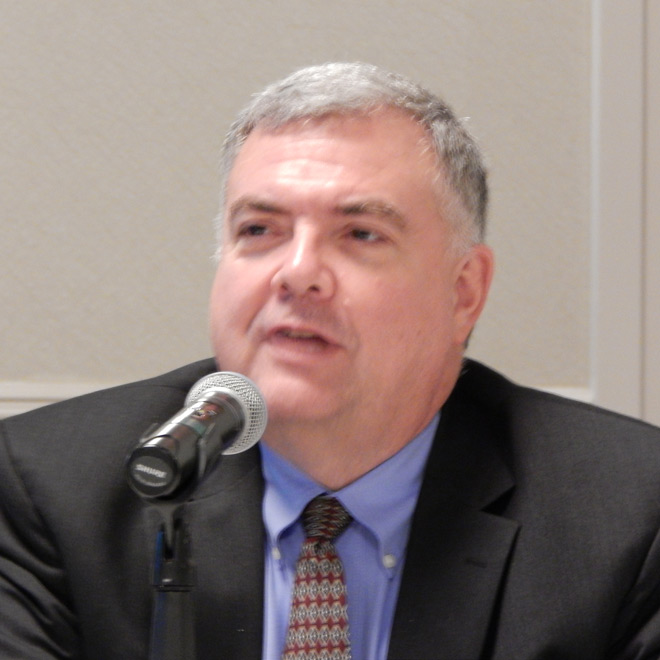By Rich Heidorn Jr.
LITTLE ROCK, Ark. — SPP officials and market participants last week celebrated the first year of its Integrated Marketplace, boasting of its on-time, under-budget delivery, while acknowledging there is more work to do.
“We don’t have all the bells and whistles of everybody [else’s market]. But we do have a good pick-up truck to move us down the road,” said Jim Krajecki, Southwest director of wholesale services for Customized Energy Solutions, who moderated the headline session at the Gulf Coast Power Association’s briefing on SPP last week.
Krajecki noted that in its first year, SPP got 95% of its generation from the day-ahead market, while only 2.2% came through self-commitments and 2.5% from the reliability unit commitment (RUC) process. “Other regions took four to five years to get to these commitment levels,” he said.
David Walters, a former Oklahoma governor (1991–1995) who now runs his own international power development company, called the market “a game changer for developers.”
“I’ve been in this business for about 20 years. I think I spent the first … maybe 18 years complaining about SPP. I’ve been quoted as saying it was managed like the Bada Bing club,” the strip joint frequented by mobsters in “The Sopranos,” he said, prompting laughter from the audience of about 70 — and winces from SPP officials in attendance.
“But it’s a lot different now,” Walters continued. “I’m really excited about this Integrated Market. [It is] somewhat delayed compared with the other areas of the country but a remarkably complex system was established with very few hiccups.”
“From an operational aspect things have been very smooth compared to what I saw in ERCOT,” agreed Seth Cochran, manager of market affairs and origination for DC Energy. “Not only that but they didn’t have any slippage in the timelines and I think they did it for a quarter of the cost. So there’s a good story to tell there.”
Improvements Needed: Ramping Product
Speakers also discussed changes they’d like to see. Several speakers called for developing a ramping product to take advantage of the region’s wind resources and incentivize quick-start generators.
Cliff Franklin, senior regulatory specialist for Westar Energy, said SPP is overly reliant on RUCs compared with MISO, which he said makes better use of the day-ahead market.
“The reason that’s bad is because then deviations get hit with all that cost and that discourages imports [and] exports in real time,” he said. “When you need help you don’t want people worrying about their RUC distribution charges. You want people to efficiently trade in the market in real time.”
Krajecki noted that SPP’s available ramp has declined from about 375 MW/minute in August 2014 to 200 MW/minute in February 2015, which he said is leading to more constrained periods and market volatility.
Franklin said ramping can be improved with better compensation.
Fast-ramping units are “getting [payment for] energy and they’re typically at minimum load. That’s not real good incentive,” he said.
SPP officials are aware of the market’s desire for a ramping product. (See SPP Board Rejects Short-Term Study; Impact on Quick-Start Units Debated.)
But it won’t be easy to achieve, said Richard Dillon, SPP’s director of market design. “It sounds very easy. I’m going to pay somebody for how fast they can press on the gas pedal and get out of the way of the truck coming up the back end. It sounds really easy but you set yourself up for: Am I offering ramp or am I offering energy? And they actually start contradicting each other if you don’t do the design correctly. … That is not going to be a small project.”
Jodi Woods, SPP’s manager of the day-ahead market, said the RTO is working to minimize use of the RUC process. “Some of it’s just been a learning process for the operators who are doing some of those commitments,” she said.
Transmission Congestion Rights Funding
DC Energy’s Cochran said the underfunding of transmission congestion rights has been a big disappointment for his company.
SPP’s 84.5% funding in March 2015 is “bottom-of-the-barrel,” he said, noting that ERCOT averages about 95%.
“If this goes on, it will ultimately drive out liquidity. People won’t want to participate. I’ve talked to numerous traders. When their targeted amounts are getting hair-cut by [as much as] 40% … it just disincentivizes trading. They no longer want to participate in that kind of market.”
Overcollection of Losses
SPP’s Dillon said overcollection of marginal losses is causing too much day-ahead trading at the expense of the real-time market. “As in many designs you go in and you have a lot of theories. And overcollected losses was one of those where it actually played out and we went, ‘Oops, this is providing the wrong incentive.’”
RTO officials hope a revised rule, effective May 29, will solve the problem.
Seams Coordination
Dillon said SPP also is considering changes to rules setting a single interface price for the seam with MISO, which leaves the RTO vulnerable to gaming by traders — an issue that will become more acute when the Heartland Consumers Power District, Basin Electric Power Cooperative and the Western Area Power Administration’s Upper Great Plains Region join SPP in October. (See Spurned by Entergy, SPP Expands in Great Plains.)
“Our border is very long to begin with,” Dillon said. With WAPA “you have a single price representing from the Gulf Coast all the way up to Canada, [although] the Entergy area is very different from [the] Kansas City area, which is very different from the North and South Dakota area. SPP is looking at [whether it can] mitigate the gaming such that we can break it into multiple prices.”




